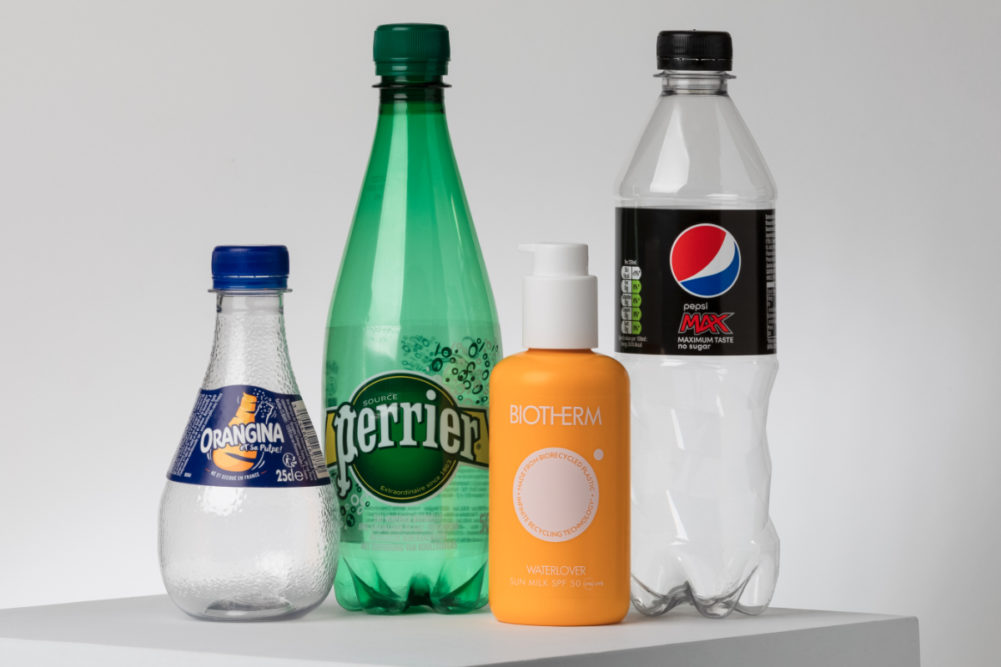CLERMONT-FERRAND, FRANCE — A consortium of consumer packaged goods companies has unveiled what they are calling the “first food-grade PET plastic bottles produced entirely from enzymatically recycled plastic.” The consortium consists of Nestle SA, PepsiCo, Inc., Suntory Beverage & Food Europe and L’Oreal and working with Carbios, a biotech company.
“In a world first, we have created food-grade clear bottles from enzymatically recycled colored and complex plastic with identical properties to virgin PET, and in partnership with the consortium, we have proved the viability of the technology with the world’s leading brands,” said Jean Claude Lumaret, chief executive officer of Carbios. “This is a truly transformational innovation that could finally fully close the loop on PET plastic supply globally, so that it never becomes waste.”
Enzymatic recycling overcomes the issue of degradation in conventional recycling and can be used on any type of PET plastic. Because Carbios’ recycling process works under mild conditions, it also lowers the carbon footprint of PET waste treatment by saving 30% of CO2 emissions compared to a conventional end-of-life mix of incineration and landfill, taking virgin PET production substitution into account, the company said.
Nestle, through its Nestle Waters business unit in Vittel, France, has produced prototype Perrier bottles made from colored recycled PET materials. The company said the bottles were tested for quality and performance as well as adapted to withstand the pressure of carbonated water.
"It is very exciting to see that the quality of the prototype bottles made from 100% colored recycled PET materials is virtually identical to clear virgin PET,” said Jean-Francois Briois, head of packaging material science environmental sustainability for Nestle Waters global research and development. “When we reach industrial scale, this enzymatic recycling technology will enable us to produce high-quality rPET bottles and help Nestle in its journey to reduce the use of virgin plastics."
 Carbios plans to break ground on a pilot manufacturing plant in September and will scale to a larger plant with 40,000 tons’ capacity that will be completed in 2025. Carbios also plans to license its technology to PET manufacturers.
Carbios plans to break ground on a pilot manufacturing plant in September and will scale to a larger plant with 40,000 tons’ capacity that will be completed in 2025. Carbios also plans to license its technology to PET manufacturers.
“We are dedicated to reducing the virgin plastic we use, and with the breakthrough Carbios enzymatic recycling technology, we can help keep valuable material in the circular economy, reduce waste and take another step toward a truly closed-loop system,” said Ron Khan, global vice president of packaging, beverages for PepsiCo, Inc., Purchase, NY.
The Carbios consortium is not the only group working to create more environmentally friendly packaging solutions. This past February, The Coca-Cola Co., Atlanta, announced a limited trial in Hungary of a paper bottle prototype. The new bottle consists of a paper shell with a recyclable plastic lining and cap. The technology is designed to create 100% recyclable bottles made of sustainably sourced wood with a bio-based material barrier capable of resisting liquids, CO2 and oxygen, and suitable for beverages, beauty products and other liquid goods.
“Our vision is to create a paper bottle that can be recycled like any other type of paper,” said Stijn Franssen, research and development packaging innovation manager for the Coca-Cola Co. “A paper bottle opens up a whole new world of packaging possibilities, and we are convinced that paper packaging has a role to play in the future.

